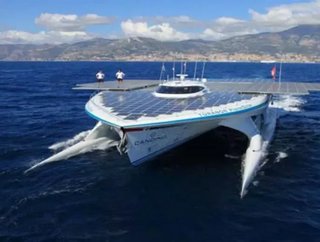Turanor Solar Powered Yacht's Journey Around the World

Written By : John Shimkus
For you alternative energy execs looking to take on the high seas without needing to refill with CO2 emitting diesel fuel, then perhaps a solar powered yacht is in your future. The Turanor PlanetSolar yacht arrived in the Marquesas Islands this March on its journey around the world. The feat gives the Turanor the distinction of traveling the longest distance of any solar powered vehicle, having traveled over 10,000 miles on its 32,000-mile trip.
The Turanor’s mission is to send a green message that long-distance transportation can be bolstered by solar power. The PlantSolar team is aiming to show the world that commercial shipping could be accomplished without the use of fossil fuels.
Project founder Raphael Domjan said upon arrival to the Marquesas Islands, "We are proud to exceed the limits of solar mobility. This is a big success for the whole team of PlanetSolar and for our partners who for many years have given their know-how to this wonderful project. We are very glad to demonstrate that we really have the technology to change."
SEE OTHER TOP STORIES IN THE WDM CONTENT NETWORK
Collaboration and Consensus Building for Arctic Offshore Oil and Gas
Beyond Solar Panels: Six Types of Solar Power Plants
The Remote Controlled Mine: Robotic and Virtual Mining Machinery and Equipment
Check out the latest edition of Energy Digital!
The Turanor is a catamaran-style vessel with a flat top that features several solar panels. It is constructed of lightweight carbon fiber and powered by four electric motors. The vessel is capable of carrying a charge and moving for three days without sunshine in case of storms or cloud cover.
The name, “Turanor,” is derived from J.R.R. Tolkien’s “Lord of the Rings,” and means “power of the sun.” The yacht is owned by Swedish entrepreneur Immo Stroher, who plans to hold seminars following the ships journey around the world, stating, "I want to demonstrate that it is possible to achieve commercially realistic earnings over the long term with advanced technologies."






